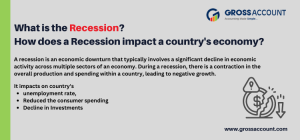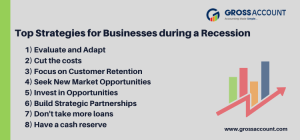Introduction
As we know that whenever some natural events or some geopolitics events occur the world goes into a recession. Recession is the technical part of macroeconomics. Whenever it occurs businesses need to find the solution for their businesses. Because even if you try most when the whole world is in this period, you are not going to earn as much as you earn earlier.
In times of economic collapse, businesses face significant challenges. However, with the right strategies in place, companies can navigate through a recessionary period and even find growth opportunities.
Nowadays you heard the news that this IT company or Big companies are laid off this much amount of employees. Why this? You can say one point is because of the ongoing war between Russia and Ukraine. It sets the base for this recession. Here is some news.
As per Times Now News – Amazon Layoff 9000 employees in March-2023
As per NewYork Times – Twitter lay off 2000 employees in Feb-2023.
And it continues. Many big companies or firms are laying off their employees.
However, In this blog we will outline some key strategies that businesses should consider during a recession, focusing on minimizing losses and increasing profitability. Whether you’re a business owner or simply interested in the world of entrepreneurship, these strategies can provide valuable insights.
First, some users have questions like What’s the meaning of recession. So let’s take a look at what is recession and how it impacts the country’s economy.

What is the Recession?
A recession is an economic downturn that typically involves a significant decline in economic activity across multiple sectors of an economy. During a recession, there is a contraction in the overall production and spending within a country, leading to negative growth.
Example: Let’s say there is a recession in a country. People start losing their jobs, which means they have less money to spend. As a result, they cut back on buying non-essential items, such as new clothes or eating out at restaurants. This decrease in consumer spending then affects businesses, leading to a decline in their sales and profits. Eventually, this downward spiral of reduced spending and economic activity can have a widespread impact on the country’s economy.
How does a Recession impact a country’s economy?
Here are just a few examples of how a recession impacts a country’s economy.
1) Unemployment: One of the most noticeable impacts of a recession is a rise in unemployment. As we see earlier that big companies or businesses struggle with their account and cut costs, they may reduce their workforce or even shut down entirely, resulting in job losses.
2) Reduced Consumer Spending: During a recession, people tend to be more cautious with their money. They cut back on unnecessary spending and focus on essential items.
3) Decline in Investments: During uncertain economic times, investors may become hesitant to invest in businesses and financial markets.
It’s important to note that the exact impact of a recession can vary depending on the severity and duration of the economic downturn, as well as the specific economic structure and policies of a country. Now let’s take a look what are the approaches that businesses should use in the recession period.
Top Strategies for Businesses during a Recession

1) Evaluate and Adapt
During a recession, businesses must assess their current operations and make necessary adjustments. Start by conducting a thorough analysis of your business model, identifying areas that may be vulnerable to economic downturns.
Explore potential cost-saving measures, such as streamlining processes, renegotiating contracts, or reducing non-essential expenses. Additionally, consider diversifying your product or service offerings to cater to changing market demands.
2) Cut the costs
Cutting costs is an essential strategy for businesses, especially during challenging economic times. Here are some strategies businesses can consider to effectively reduce costs:
- With streamlined operations, you can potentially reduce labour costs and increase productivity.
- Reach out to your suppliers and negotiate better terms or discounts.
- Explore alternative suppliers who may offer similar quality products or services at lower costs.
- Review and optimize your insurance policies to ensure you have adequate coverage at the best possible rates.
- Implement effective inventory management practices to avoid excessive stock levels and associated holding costs.
- Invest in affordable software solutions, including accounting and payroll software, to automate routine financial tasks.
3) Focus on Customer Retention
Retaining existing customers becomes paramount during a recession. Implement strategies to enhance customer loyalty, such as personalized marketing campaigns, exceptional customer service, and loyalty programs.
Customer retention is a good way to in a recession because some people or many companies not finding any solution or spend money on new things. moreover, existing customers are a benefit for any business because they trust us and are happy to invest more.
Communicate regularly with your customers to understand their evolving needs and find innovative ways to meet those needs. Building strong relationships with your customer base can lead to repeat business, increased customer referrals, and a more stable revenue stream.
4) Seek New Market Opportunities
While a recession may bring challenges, it can also present opportunities for businesses. Because some businesses do not buy or spend money on any new thing than others are searching for a solution that reduces their cost and makes a profit. Find those businesses according to your niche and present solution for them.
Explore new market segments that may be less affected by the economic downturn. For example, if your business primarily serves the luxury market, consider diversifying into more affordable product or service lines that cater to budget-conscious customers. Adapting to changing market dynamics can help businesses stay resilient and find new revenue streams.
5) Invest in Opportunities
In a recession, many businesses tend to cut back on marketing budgets, but this can be counterproductive. Investing strategically in marketing efforts can help your business maintain visibility, attract new customers, and gain a competitive edge. Leverage digital marketing channels, such as social media and online advertising, which offer cost-effective and targeted approaches.
Moreover, prioritize innovation to differentiate your business and create value for your customers. Explore ways to enhance existing products or services, develop new offerings, or improve operational efficiency.
6) Build Strategic Partnerships
Collaborating with complementary businesses can be mutually beneficial during a recession. Look for partnership opportunities that allow you to leverage each other’s strengths, share resources, and reach new markets. Joint marketing campaigns, cross-promotions, or co-branded initiatives can help expand your customer base and reduce costs.
7) Don’t take more loans
During a recession, businesses must exercise caution when it comes to taking on additional loans. Here’s why:
- Taking on more debt during a recession can increase the financial burden on a business. It adds to the existing debt load and can lead to difficulties in meeting repayment obligations.
- Increased debt levels can heighten the risk of default, especially if business conditions worsen during a recession.
- Instead of relying solely on loans, businesses should prioritize effective cash flow management. This involves optimizing receivables, managing payables, and implementing stringent credit control measures.
8) Have a cash reserve
Building and maintaining a cash reserve is crucial for businesses, especially during a recession.
- A cash reserve provides a safety net during economic downturns. It acts as a buffer, helping businesses navigate through challenging times.
- It provides the resources needed to seize potential opportunities, invest in innovation, or pivot the business model if required.
- Having a cash reserve reduces the need for businesses to depend heavily on borrowing during a recession.
- It demonstrates financial stability and resilience, which can positively impact relationships and business opportunities, even during challenging economic times.
Conclusion
Navigating a recession can be challenging for businesses, but by implementing the right strategies, companies can minimize losses and position themselves for long-term success. Throughout this blog, we have explored several key strategies that businesses should consider during a recession.
Remember, every business is unique, and it’s important to tailor these strategies to your specific circumstances and seek professional advice when needed. By combining a forward-thinking mindset, careful financial management, and the implementation of effective strategies, businesses can thrive even in the most challenging economic times.
One important aspect that can greatly aid businesses in their cost-saving and financial management efforts is the utilization of efficient accounting software. GrossAccount’s accounting software offers a user-friendly and cost-effective solution for businesses to streamline their financial processes.






